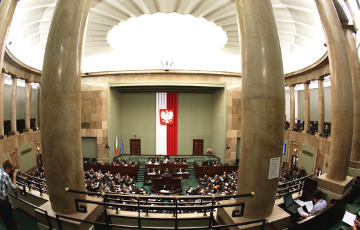Hearings On Belarus Held In Poland’s Sejm
16- 4.07.2018, 15:44
- 57,538

The situation in Belarus was discussed at the Foreign Affairs Committee of the Polish Parliament.
Head of the Foreign Affairs Committee Grzegorz Schetyna, his deputies Małgorzata Gosevska and Robert Tyszkiewicz, deputy foreign minister of Poland Bartosz Cichocki, former foreign minister Witold Waszczykowski, former deputy foreign minister Paweł Kowal, Head of the Eastern department of the Ministry of Foreign Affairs of Poland Jan Hofmokl, President of the International Solidarity Foundation Maciej Falkowski, deputies of the Polish Sejm from the parties Law and Justice and Civil Platform, analysts and journalists took part in the hearings on Belarus.
Belarus was represented by one of the leaders of the Belarusian National Congress Uladzimir Niakliaeu, leader of the European Belarus civil campaign Andrei Sannikov, Co-Chairman of the Belarusian Christian Democracy party Vital Rymasheuski, Editor-in-Chief of Charter97.org Natallia Radzina, deputy director of the Belsat TV channel Aliaksei Dzikavitski, deputy head of the Belarusian Popular Front Party Ales Straltsou, one of the leaders of the Belarusian Social Democratic Party (Hramada) Iryna Veshtard, Chairman of the United Civil Party Anatol Liabedzka and others.
At the beginning of the meeting both the organizers and the participants of the hearings condemned the arrests in Minsk of leader of the Belarusian National Congress Mikalai Statkevich and Head of the Belarusian Popular Front Ryhor Kastusiou who were to take part in the hearings in the Sejm. Mikalai Statkevich was arrested on the eve of the action of solidarity with political prisoners which was to take place in Minsk on July 3.
The Sejm of Poland also condemned the arrests of dozens of opposition activists for their participation in the July 3 rally and protestss in Kurapaty, including Pavel Seviarynets, Volha Nikalaichyk, Maxim Viniarski, Viachaslau Siuchyk, Mikalai Salianik and Aliaksandr Laurentsyeu.
Head of the Foreign Affairs Committee Grzegorz Schetyna has noted that what is happening today in Belarus reminds the situation in Poland in 1970-1980 under the Soviet occupation and said that the Polish authorities intend to support the Belarusian opposition on the way to freedom and democracy of their country.
One of the leaders of the BNC Uladzimir Niakliaeu has said that the situation with human rights in Belarus deteriorated, urging the Polish deputies not to believe in stories about a certain "improvement of the situation," since there can be nothing good if human rights are violated. The dialogue of the European Union with Lukashenka's regime, according to Niakliaeu, became a support for the dictatorial regime and a way of its preservation. However, the politician emphasized, the Belarusian National Congress urged and will urge Belarusians to go to open protest actions, since there is no other way to freedom.
Andrei Sannikov has said that today the democratic world must decisively protest against the deterioration of the situation with democracy in Belarus. According to him, the lack of an adequate reaction led to the fact that after the blocking of the largest independent website Charter97.org, censorship amendments were adopted to the Law on Mass Media; after the persecution of the leaders of the REP trade union Henadz Fiadynich and Ihar Komlik, mass reprisals against activists of independent trade unions began; the Decree "on parasites" caused the re-appearance of the Stalinist "troika". According to the leader of the European Belarus, today the dialogue should take place not between the EU and the dictatorship, but between the Belarusian democratic forces and the Belarusian authorities with or without Lukashenka's participation. The situation today is favorable for this, Sannikov assured, since the dictator has run out of money. Such a dialogue is possible, but only after the complete termination of repression against the opposition and civil society, and the most effective tool for ending repression is sanctions.
Natallia Radina has spoken about the blocking of the Charter97.org website, amendments to the Law on the Media, which introduce repressions not only against independent journalists, but also against readers of independent websites, the prosecution of freelancers and journalists working for the Belsat TV channel and Radio Racyja, criminal cases against video bloggers and the efforts of the Russian propaganda in Belarus. At the same time, Charter97.org Editor-in-Chief also noted that Belarusian independent journalists today lack the solidarity of the international community. Moreover, against this background, the financing of independent media, including the Charter’97 website, was reduced. However, being in a critical situation, the website does not stop its work for a single day. The situation with the independent media, civil society and democratic opposition in Belarus, she said, is today not only a matter of values and principles, but also a matter of the European security, which can only be guaranteed by a free democratic Belarus.
Vital Rymasheuski has noted that the openness of the European Union for Belarus should have a specific goal - holding of political and economic reforms and free elections in the country. Today, according to him, European politicians "turn a blind eye" to the violation of human rights in Belarus, there is a reduction in support for independent media, civil society and the opposition, which leads to the arrival of the "Russian world" in Belarus.
Anatol Liabedzka noted that today it is necessary to return the right to elect to Belarusians and the most important task for the opposition political parties today is the creation of an international coalition to hold free elections in Belarus.
Following the hearing, the Foreign Affairs Committee of the Polish Sejm adopted a resolution condemning the "wave of repression" in Belarus and urging the Belarusian authorities to respect human rights and adhere to the principles of freedom and democracy.










